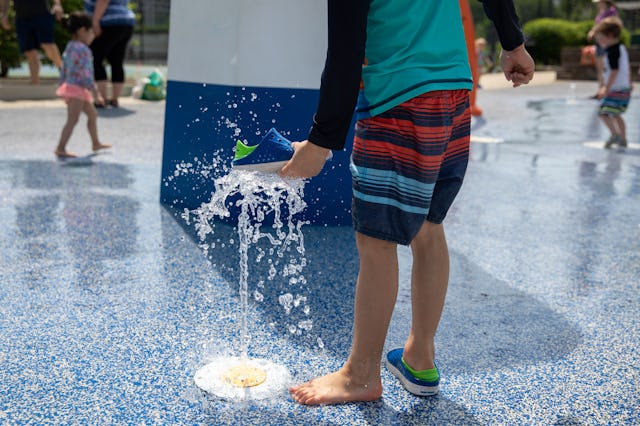That Splash Pad Your Kid Loves Could Be A Germ Factory — 6 Tips To Avoid A Waterborne Illness
A CDC report about a bacteria outbreak is raising concerns about cleanliness.

When it's stifling outside, one of the easiest ways to beat the heat is to head to your local splash pad. The water-fueled play areas have become ubiquitous across the United States, but a new report detailing two recent outbreaks of acute gastrointestinal illnesses at a splash pad in Kansas have parents wondering, Are splash pads safe for kids? Just how hygienic (or unhygienic) is this warm weather staple?
In the Centers for Disease Control and Prevention’s Morbidity and Mortality Weekly Report, 27 people became sick after ingesting splash pad water at a Kansas wildlife park in June of last year. The contaminated water led to two separate outbreaks: one of shigella bacteria and one of norovirus. Shigella bacteria causes shigellosis, which can lead to fever, stomach cramps, and bloody stools. Meanwhile, noroviruses cause diarrhea, stomach cramps, and vomiting.
This isn't the first time splash pads have been linked to illnesses, either. In 2005, more than 1,000 cases of gastrointestinal illness were traced back to a water attraction in upstate New York, per CNN. More recently, in 2020, a 6-year-old boy died after contracting primary amebic meningoencephalitis, a condition that destroys brain tissue, after playing in a splash pad in Texas.
With these cases in mind, here's what you need to know before heading to your local splash park to cool off.
Why are people getting sick at splash pads?
Unlike water parks, many splash pads aren't regulated, so the water isn't always disinfected as often as it should be. Since the water is constantly draining and recirculating to prevent it from pooling and posing a drowning risk, splash pads usually don't meet the "aquatic venue" definition, which would require the water to be disinfected regularly. Because the water is constantly being sprayed in the air, it can be difficult for the play areas to maintain the correct amount of chlorine in the water to kill bacteria.
How can you safeguard your family from splash pad bacteria?
None of the illnesses in Kansas were caused by playing in the water. The bigger issue is ingesting the water at splash pads. When kids and adults play in splash pads, all manner of containments can wash off of them and then be recirculated through the water. According to the CDC, this includes feces, urine, dirt, and germs. Since young children generally utilize splash pads, poor toileting skills often come into play. "Sitting or standing on jets can rinse poop off your butt," the CDC spells out in their report.
Even if the splash pad is using a tank to treat the water with chlorine or bromine, the chemicals may not be able to kill all of the germs present. This is because spraying the water naturally decreases the amount of germ-killing chemicals present. With that in mind, here's what you should do before you or your little ones start splashing:
- Shower before getting into the water.
- If you or anyone in your household is sick, particularly with diarrhea, skip the splash pad.
- Do not swallow water from the splash pad.
- Make sure your children are taking frequent bathroom breaks.
- If your child is still in diapers, check them often to ensure they're clean. Remember, swim diapers will not prevent poop or pee from contaminating the water.
- Don't sit on the spray jets — it sounds gross, but this can wash poop off your butt and contaminate the water.
What are some splash pad alternatives?
Given that many splash pads are unregulated, it would be understandable for parents to opt for an alternative playtime activity instead. One of the reasons why these play areas are on the rise is because they're an inexpensive alternative to water parks.
If you're looking for a similar activity with less stress over communal illnesses, sprinkle pads are a good option. These small, at-home splash pads are generally low in price and can be set up in your backyard. If you do have a backyard space, you can also try water-based games like water tag, slip and slides, or water balloons. You can always create your own water park at home! Turn on your sprinklers if you live in the suburbs, or blow up an inflatable set for the kids to enjoy. There are also splash pad-esq toys you can set up that are just as entertaining as the ones at the park. And if all fails, a small inflatable pool is always a strong choice.
City-dwellers might want to opt for a different free activity entirely, like a trip to the air-conditioned library or to a museum where admission for kids is free.
Ultimately, splash pads are a low-cost way to keep kids cool and entertained, and as long as your child doesn't ingest the water, the risk for illness is low. But if you're still worried, there's no harm in planning some alternative warm-weather activities for your family to enjoy.
This article was originally published on